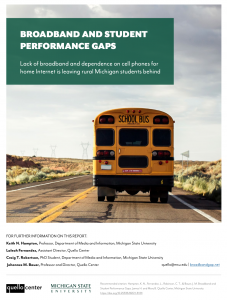Broadband and Student Performance Gaps (2020)
Background & Motivation
Our 2020 Broadband and Student Performance Gaps Study is the result of a project designed to understand the repercussions of poor or no home Internet access on student performance and the associated costs to society. The Quello Center at Michigan State University (MSU) and Merit Network, in December 2018, brought together the K12 Citizen Science Working Group, a small group of stakeholders from Michigan school districts. From this group, three Intermediate School Districts (ISDs) volunteered to work with the Quello Center and Merit Network to develop and pilot an approach to measure rates of home connectivity among their students and explore the relationship between connectivity and student performance.
Key Findings
 This work is unique in its focus on rural broadband, and in the sample, which includes a large number of households that are either cell phone dependent or cannot get broadband access where they live. The socioeconomic diversity of the sample made it possible to better differentiate the role of socioeconomic factors from access factors for a range of student outcomes.
This work is unique in its focus on rural broadband, and in the sample, which includes a large number of households that are either cell phone dependent or cannot get broadband access where they live. The socioeconomic diversity of the sample made it possible to better differentiate the role of socioeconomic factors from access factors for a range of student outcomes.
We find that students who do not have access to the Internet from home or are dependent on a cell phone alone for access perform lower on a range of metrics, including digital skills, homework completion, and grade point average. They are also less likely to intend on completing a college or university degree. A deficit in digital skills compounds many of the inequalities in access and contributes to students performing lower on standardized test scores, such as the SAT, and being less interested in careers related to science, technology, engineering, and math.
Method
We focus on Internet connectivity outside of school among middle and high school students enrolled in rural and small-town schools. We examine how differences in the type and quality of home connectivity (e.g., broadband vs. cell phone) relate to school performance and other outcomes in students in grades 8-11, in fifteen predominantly rural, Michigan, school districts. De-identified student data were collected through: (1) a paper survey completed in class by students aged 13 and older in partner school districts, (2) standardized test scores (i.e., PSAT 8/9, PSAT 10, and SAT) provided by school districts, and (3) home Internet speed tests. Between May and June 2019, 3,258 students from fifteen school districts in twenty-one schools across 173 classrooms completed the project survey; they represented 70.6% of students aged 13 and older in grades 8-11 in the participating districts.
Contact
Dr. Keith N. Hampton: khampton@msu.edu | +1.517.432.6747
Dr. Johannes M. Bauer: bauerj@msu.edu
Quello Center: quello@msu.edu | +1.517.432.8005
Additional Resources
This project complements the Michigan Moonshot initiative, a collaboration between Merit Network, the Quello Center, and M-Lab. The Michigan Moonshot Broadband Framework offers a comprehensive guide for public, private and nonprofit organizations; government agencies; educational institutions; regional broadband champions; policymakers and others interested in solving the broadband access challenge.
Recommended Citation
Hampton, K. N., Fernandez, L., Robertson, C. T., & Bauer, J. M. Broadband and Student Performance Gaps. James H. and Mary B. Quello Center, Michigan State University, March 3, 2020. https://doi.org/10.25335/BZGY-3V91
Publications and Conference Papers
Hampton, K.N. & Shin, I. (2022). Disconnection More Problematic for Adolescent Self-Esteem than Heavy Social Media Use: Evidence from Access Inequalities and Restrictive Media Parenting in Rural America, Social Science Computer Review, published online August 5, 2022. Download at https://doi.org/10.1177/08944393221117466.
Hampton, K.N., & Shin, I. (2022, May). Disconnection is More Problematic for Adolescent Self-Esteem Than Heavy Social Media Use: Digital Inequality, Restrictive Parenting, and the Relationship to Time Rural Youth Spend with Friends and Family. International Communication Association. Hybrid Conference. May 25-30, 2022, Paris, France.
Hampton, K.N., Robertson, C.T., Fernandez, L., Shin, I., & Bauer, J.M. (2021). How variation in internet access, digital skills, and media use are related to rural student outcomes: GPA, SAT, and educational aspirations. Telematics and Informatics, 101666, https://doi.org/10.1016/j.tele.2021.101666.
Bauer, J.M.; Hampton, K.N.; Fernandez, L.; Robertson, C., Overcoming Michigan’s Homework Gap: The Role of Broadband Internet Connectivity for Student Success and Career Outlooks (October 19, 2020). Quello Center Working Paper No. 06-20, Download from: SSRN or DOI

